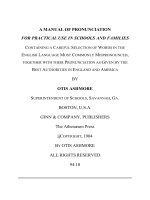drug use in sports
Bạn đang xem bản rút gọn của tài liệu. Xem và tải ngay bản đầy đủ của tài liệu tại đây (34.05 KB, 2 trang )
Smoak 1Michael SmoakProfessor RudolphEnglish 10115 November
1996 Drugs: Hurt Players and Sports Brett Favre, Diego
Maradona, and Darryl Strawberry are all big name sport stars. They all
play different sports, but all have the same problem: they tested positive
for using illegal drugs. Cocaine, anabolic steroids, and painkillers are
just a sample of drugs found in sports. Cocaine is described this way, "It
makes you feel like you can do anything, and for athletes who long to be
in control all the time, that's a strong temptation" (Coffey 1).
Anabolic-androgenic steroids are synthetic forms of hormones that
produce muscle faster (Rozin 176). Over fifty percent of the players in
the National Football League are weekend or recreational users of
cocaine (Burwell 1) . Forty-four Olympians have been caught with steroid
use since 1972 (Corelli 28). Through Favre's painkillers, Strawberry's
and Maradona's cocaine, one can see that drugs hurt the athletes as well
as the sport. First Brett Favre, who was the Most Valuable Player in the
National Football League last season, entered a drug abuse center for his
addiction to Vicodin, a very strong painkiller (Plummer 129 ). Favre had
problems because of Vicodin. Favre suffered a seizure in February while
in surgery to repair a broken bone. The seizure resulted from the abuse
of the painkiller (Howard 1). Favre states, "I went to Topeka, because
the pills had gotten the best of me" Smoak 2( qtd. in Plummer 129).
Favre's daughter Brittany asked his wife Deanna, "Is he going to die?"
(qtd. in Plummer 129). He not only scared himself but his family as well.
Favre not has to submit up to ten urine tests a month. His losses were
internal as well. "It is kind of embarrassing," says Favre; "I will do
whatever it takes" (qtd. in Plummer 133). He spent several weeks in
rehabilitation but was not be fined or suspended. If caught again his
charge will be a four game suspension with loss of pay. Another
famous athlete, Diego Maradona, was once considered the most skilled
soccer player in the world. Now he is considered a loser. Maradona
was banned from international soccer play for testing positive for cocaine.
Shortly after that, he was arrested for cocaine possession (Longman 1).
The fifteen month suspension ended in time for Maradona to play in the
1994 World Cup. He was then caught with five illegal drugs in his
system. One doctor called it a "cocktail drug" (Sports Illustrated 10). He
was then kicked out of the World Cup. "This latest behavior will no doubt
further damage Maradona's already sagging reputation, "said U. S.
soccer team member Claudia Reyna (Longman 1). Drugs hurt
Maradona's health and reputation and prevented him from becoming a
World Cup champion. Maradona wanted to leave the World Cup stage a
champion. Instead he left as its most pathetic figure (Sports Illustrated
10). As a final example, National League rookie of the year for 1983
and 1986 world series champ, Darryl Strawberry had a great future going
for him, but not anymore. Strawberry checked himself into the Betty
Ford Center for cocaine abuse (Verducci 16). Five months later he
tested positive for cocaine. After this, Strawberry had no team to call his
own, as he was suspended from baseball (Verducci 17). Strawberry
entered his third rehabilitation center in five years (Verducci 18). Drugs
kept Strawberry away from his family. Ruby, his mother, said, "He didn't
care what was going on with the family. He was not in touch with us" (
qtd. in Verducci 20 ). Cocaine can take a person away from a lot of
things, but taking away from aSmoak 3family has to be the worst.
Strawberry has had three wives, and five children by those three. Ruby
said about the second, "His marriage was a bad one from the beginning"(
qtd. inVerducci 22). Cocaine took many valued things away from
Strawberry: his wives, children, family, baseball, and, of course, money.
Strawberry has since come clean and was a member of the New York
Yankee World Championship team. These athletes not only hurt
themselves but their respected sports. These professionals are looked
at as heroes. Little children think these athletes can do no wrong. It
would be dangerous for parents to let their children to have Daryl
Strawberry as a hero. Drug charges are also an embarrassment to the
sport. "It dents the sport a little," said Roy Wegerle about Maradona's
charges. Fernando Clavijo said that soccer players, like other athletes,
are role models, and "we have to be careful what we do" (Longman 1). It
would be difficult to tell a kid who wants to be like Maradona, "No son
you do not want to be like him." These popular players become
suspended, therefore fewer people come to the games, which means
less money for the sport. Drugs are hurting sports everywhere. In 1994,
the Chinese woman's swim team captured six gold and three silver
medals in the world championships held in Rome, everyone shouted
"steroids!" "How else could anyone get so good so fast" (Rozin 176)? It
has nothing to do with what sport it is, drugs can have a major effect on it.
Though the use of drugs seems to be getting greater, the control of
them is getting stronger too. This past summer, in Atlanta, the Olympic
Games held its biggest drug crackdown in history. In the National
Football League, random drug testing is becoming effective. There are
officials that report to every team and educate about drug use. Then
there is always rehabilitation (Burwell 1). Suspensions are greater than
ever and fines are outrageous. The chance to play and perform must
outweigh the desire to experiment with drugs and suffer the painful
consequences of drug abuse. Smoak 4Works CitedBurwell,
Bryan. "The NFL Confronts the Burgeoning Drug Crisis." Social Issues
Resources Series August 21, 1983, Article #54 Volume 2.Coffey,
Wayne. "Cocaine Back in Sports News, and Many Ask About
Bias'Death." New York Daily News. May 20, 1996."Cornered Kicker."
Sports Illustrated. July 11, 1994. Volume 81.Corelli, Rae. "The Drug
Detectives." Maclean's . July 22, 1996, Volume 109.Longman, Jere.
"Maradona's Suspension Disappoints U.S. Team" New York Times. July
1, 1994.Milwaukee Journal Sentinel. "Packers QB Favre Enters
Substance Abuse Program." May 15, 1996.Plummer, William.
"Beating the Blitz." People. October 28, 1996.Rozin, Skip. "Steroids and
Sports: What Price Glory?" Business Week. October 17, 1994.Sports
Illustrated. "Cornered Kicker." July 11, 1994. Volume 81.Verducci, Tom.
"The Hard Price of Hard Living." Sports Illustrated February 27, 1995.
Volume 82.









